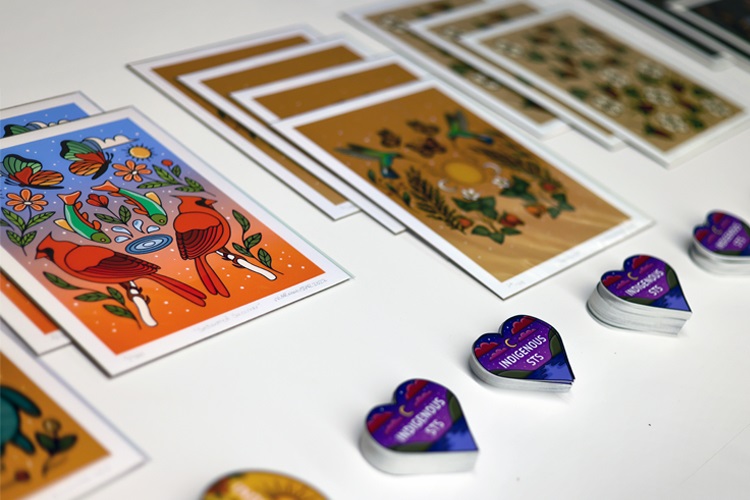U of T’s Technoscience Research Unit recently welcomed more than 30 Indigenous scholars from across Turtle Island (North America), for its first “Gathering Indigenous Science, Technology and Environment” symposium.
“There was a feeling of rejuvenation, community and connection,” says Kristen Bos, co-director of the Technoscience Research Unit and an assistant professor of Indigenous Science and Technology Studies in the Historical Studies Department at the University of Toronto Mississauga.
“We're trying to build up our capacity here and make the University of Toronto a hub for Indigenous science, technology and environmental studies,” added Bos, who is also cross-appointed to the Faculty of Arts & Science’s Women & Gender Studies Institute.

The event featured a series of “lightning talks” with 34 scholars sharing information on their research goals, resources, challenges and needs. Among the presenters were:
Mia McKie, a clinical assistant professor of Indigenous Studies at the University of Buffalo, discussed her role as co-primary investigator for the Haudenosaunee Archive, Research and Knowledge portal (HARK), which is an aggregator of digital content featuring projects, websites, content management systems, cultural heritage materials, and archive and resource collections developed by and for Haudenosaunee people and communities.
Dominique David-Chavez, an assistant professor of Indigenous Natural Resource Stewardship at Colorado State University discussed her research which explores how to best apply local and Indigenous knowledge and governance systems in natural resources-focused research and education.
Erin Konsmo, a Métis visual artist and community-based researcher living in Winnipeg, shared insights and ethical questions from their harvesting and fish scale arts practice that could help bridge the gaps between Indigenous and Western scientific inquiries and drives.
Deondre Smiles, an assistant professor in the University of Victoria’s Department of Geography, highlighted his research that examines Indigenous/settler contestations over Indigenous remains and burial grounds.
And Jaris Swidrovich, an assistant professor at U of T’s Leslie Dan Faculty of Pharmacy, discussed their experience as Canada’s only First Nations pharmacy professor, removing barriers to accessing HIV prevention drugs and providing better care to Indigenous Peoples in Canada.
The event also featured two public keynote addresses — the first by Hi’ilei Julia Kawehipuaakahaopulani Hobart an assistant professor of ethnicity, race, and migration at Yale University.

Her lecture: “Surfacing: A Sand Island Story” outlined a paper she wrote about the eviction of Indigenous Hawaiian (Kanaka Maoli) residents in 1979 from a small island within the city of Honolulu that had become a quiet fishing village.
Both her paper and the talk examined the eviction of this Indigenous community, and ethical questions of property making, property ownership and the process of creating new lands such as man-made islands.
The second lecture by Marisa Duarte, an associate professor of justice and social inquiry at Arizona State University was titled, “Essential Elements for Indigenous Futures: Co-Creating Indigenous STS Research Agendas.”
She dove into the challenges and opportunities of building internet networks across Indigenous communities, including communities lacking the necessary infrastructure.
She touched on how many U.S. tribes and Indigenous organizations have created their own communication projects, from streaming radio to building networks to telecommunications advocacy.

Duarte examines these projects to explore the significance of information flows and information systems to Indigenous sovereignty, and toward self-governance, self-determination, and decolonization.
For many of the attendees, this symposium offered their first opportunity to reconnect with fellow Indigenous scholars since the COVID-19 pandemic, which led to professional and personal isolation.
“A lot of us are working in different fields, we're in medical sciences, environmental sciences, so everybody's coming from their own silos,” says Bos. “In some cases, they are the only ones in their department, the only one at their university.”
The symposium also brought with it an air of collegial warmth and friendship.
“A lot of our research topics are very heavy, they deal with big problems like climate change, food sovereignty and HIV-AIDS,” says Bos. “So people wanted a space to laugh, a space to have a lightness to their research.
“And the beautiful thing about Indigenous scholars, is that regardless of where we're coming from, we bring a shared sense of purpose, and humour in ways that we can be more of our full selves. That all led to a general sense of rejuvenation.”
The event was funded by the Acceleration Consortium via the Canada First Research Excellence Fund, the Canada Research Chair in Science and Technology Studies, and the Environmental Data Justice Lab.

